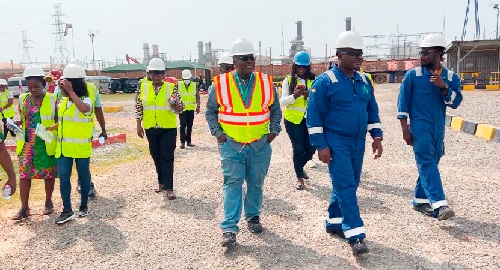The government has procured enough alternative fuels to fire plants to generate electricity to make up for the shortfall occasioned by the shutting down of the West African Gas Pipeline.
The fuels secured will enable combined cycle plants (those that use gas and heavy fuels) in the Tema power enclave to generate power without any interruption.
The alternative fuels include distillate fuel, heavy fuel oil and light crude oil to ensure a stable electricity supply across the country.
The Minister of Energy and Green Transition, John Abdulai Jinapor, who made this known in an exclusive interview with the Daily Graphic, said: “Light crude oil is expected to arrive on the 11th of February this year. However, it will take a minimum of two weeks to treat it”.
He said that in the meantime, the country would have to rely on expensive diesel fuel.
Mr Jinapor, however, assured Ghanaians that the government was committed to addressing the impact of the ongoing shutdown of the West African Gas Pipeline Company (WAPCo) pipeline.
Pigging
WAPCo, which operates the 569-kilometre pipeline from Ajido, Lagos State, Nigeria to Takoradi in the Western Region, temporarily shut down its gas transmission service for routine maintenance to enable the company to launch its Pipeline Inspection Gauge (PIG) to inspect and clean the 569km stretch of the pipeline as required by regulation.
The pigging exercise, which involves cleaning and inspecting the gas pipeline, was “initially planned for January but was moved to February”, Mr Jinapor said.
“We hope there are no major challenges during the inspection, as that could extend the process and require additional procurement of costly liquid fuel,” Mr Jinapor said.
“Gas remains the preferred option because it is cheaper and more stable compared to liquid fuels,” he added.
Mr Jinapor revealed that the government was in close contact with WAPCo to monitor developments and ensure that any potential setbacks were addressed promptly.
He, however, acknowledged that the country’s power sector remained fragile, with fuel supply challenges persisting.
“We used to talk about excess capacity but today our capacity is barely enough to meet demand. Any major breakdown could create a serious power deficit,” he added.
Additional strain
Mr Jinapor said some power plants in the country operated solely on gas and could not run on alternative fuels.
This limitation, he said, had put an additional strain on the energy sector.
He assured Ghanaians that the government was implementing the necessary measures, with GRIDCo coordinating efforts to minimise the impact on power supply.
“While the situation is tight, with the measures we have in place, and barring any unforeseen circumstances, we should be able to supply reliable and adequate power,” he added.
Commitment
The minister stressed that the government was committed to making the system more robust and reliable.
“We are building on what we inherited to ensure long-term stability in the energy sector,” he said.
Mr Jinapor reiterated the government’s commitment to keeping Ghanaians informed and ensuring minimal disruptions.
“We will continue to monitor the situation and update the public as necessary,” he said.
Background
The major maintenance activities, which began on February 5, 2025, are expected to be completed by March 2, this year.
This will enable the company to launch its Pipeline Inspection Gauge (PIG) to inspect and clean the 569km stretch of pipeline as required by regulation.
The process will cut gas supply significantly from Nigeria through to Ghana. The shutdown will also affect the reverse flow of gas from Atuabo in the Western Region to the country’s power plants in the Tema Power Enclave where huge megawatts of power are needed for industrial, commercial and domestic uses.
The mandatory cleaning and inspection activities, which have been postponed three times since last year, will also ensure safe and reliable operations of the facility in conformity with industry best practices.
However, during the process, technically known as pigging, the company said an average of about 90,000 million standard cubic feet per day (mmscf/d) of gas would be required to push the pipeline which would be available for use by plants in the Western Region.

